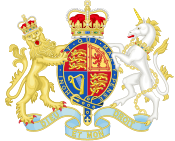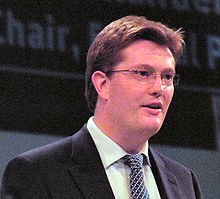- Chief Secretary to the Treasury
-
Chief Secretary to the Treasury 
Arms of Her Majesty's Government
HM TreasuryStyle The Right Honourable Appointer David Cameron Inaugural holder Henry Brooke Formation 8 October 1961 Website HM Treasury United Kingdom 
This article is part of the series:
Politics and government of
the United KingdomGovernment- Sovereign
- Queen Elizabeth II
- The Crown
- Royal Prerogative
- Privy Council
- Cabinet
- Her Majesty's Civil Service
Foreign policy
The Chief Secretary to the Treasury is the third most senior ministerial position in HM Treasury, after the Prime Minister (the First Lord of the Treasury) and the Chancellor of the Exchequer (the Second Lord of the Treasury). In recent years, the office holder has usually been given a junior position in the British Cabinet. It was created in 1961, to share the burden of representing the Treasury with the Chancellor of the Exchequer.
The position's responsibilities include negotiating with departments about budget allocations, public sector pay, welfare reform, and procurement policy.
Chief Secretaries to the Treasury
Chief Secretary to the Treasury Entered office Left office Political party Chancellor of the Exchequer Henry Brooke 9 October 1961 13 July 1962 Conservative Selwyn Lloyd John Boyd-Carpenter 13 July 1962 16 October 1964 Conservative Reginald Maudling John Diamond 20 October 1964 19 June 1970 Labour James Callaghan Roy Jenkins Maurice Macmillan 23 June 1970 7 April 1972 Conservative Iain Macleod Anthony Barber Patrick Jenkin 7 April 1972 8 January 1974 Conservative Thomas Boardman 8 January 1974 4 March 1974 Conservative Joel Barnett 7 March 1974 4 May 1979 Labour Denis Healey John Biffen 5 May 1979 5 January 1981 Conservative Sir Geoffrey Howe Leon Brittan 5 January 1981 11 June 1983 Conservative Peter Rees 11 June 1983 2 September 1985 Conservative Nigel Lawson John MacGregor 2 September 1985 13 June 1987 Conservative John Major 13 June 1987 24 July 1989 Conservative Norman Lamont 24 July 1989 28 November 1990 Conservative John Major David Mellor 28 November 1990 10 April 1992 Conservative Norman Lamont Michael Portillo 10 April 1992 20 July 1994 Conservative Kenneth Clarke Jonathan Aitken 20 July 1994 5 July 1995 Conservative William Waldegrave 5 July 1995 2 May 1997 Conservative Alistair Darling 3 May 1997 27 July 1998 Labour Gordon Brown Stephen Byers 27 July 1998 23 December 1998 Labour Alan Milburn 23 December 1998 11 October 1999 Labour Andrew Smith 11 October 1999 29 May 2002 Labour Paul Boateng 29 May 2002 6 May 2005 Labour Des Browne 6 May 2005 5 May 2006 Labour Stephen Timms 5 May 2006 27 June 2007 Labour Andy Burnham 28 June 2007 24 January 2008 Labour Alistair Darling Yvette Cooper 24 January 2008 5 June 2009 Labour Liam Byrne 5 June 2009 11 May 2010 Labour David Laws 12 May 2010 29 May 2010 Liberal Democrat
(Coalition Government)George Osborne Danny Alexander 29 May 2010 Liberal Democrat
(Coalition Government)See also
Chief Secretaries to the Treasury Her Majesty's Treasury Headquarters: 1, Horse Guards Road Ministers Chancellor of the Exchequer and Second Lord of the Treasury · Chief Secretary to the Treasury · Paymaster General · Financial Secretary to the Treasury · Economic Secretary to the Treasury · Exchequer Secretary to the Treasury · Commercial Secretary to the Treasury
Executive agencies Asset Protection Agency · National Savings and Investments · Office of Tax Simplification · Royal Mint · UK Debt Management OfficeChancellor of the Exchequer
Second Lord of the Treasury
Other Ministers Danny Alexander (Chief Secretary to the Treasury) · Mark Hoban (Financial Secretary to the Treasury) · Chloe Smith (Economic Secretary to the Treasury) · David Gauke (Exchequer Secretary to the Treasury) · Lord Sassoon (Commercial Secretary to the Treasury)Categories:- HM Treasury
- Current ministerial offices in the United Kingdom
- Lists of government ministers of the United Kingdom
- Sovereign
Wikimedia Foundation. 2010.


